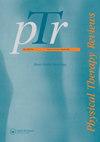Clinical course of pain and function in subacromial shoulder pain: a systematic review with meta-analysis
IF 0.8
Q4 REHABILITATION
引用次数: 1
Abstract
Abstract Objective To assess the clinical course of pain and function in patients with subacromial pain. Design Systematic review. Methods We searched Medline, Embase, AMED, Web of Science, Cochrane Library, and Scopus for randomized clinical trials and observational studies recruiting participants with subacromial pain. Pain and function scores were extracted for groups receiving either ‘no intervention’ or ‘usual care’. Changes in pain and function from baseline were pooled at 6 weeks, 3, 6, and 12 months follow-up. Random effects meta-analyses and meta-regression were performed to assess the clinical course of pain and function in subacromial pain. Results Nineteen studies were included and 17 studies were pooled. Data from 5 studies in the ‘no intervention’ group were pooled to 3 months, showing minimal improvement for pain (mean difference, MD, 5.3/100, 95%CI −0.8 to 11.4) and function (MD 3.1/100, 95%CI −1.7 to 7.9). Data from 12 studies in ‘usual care’ group were pooled to 12 months, showing significant improvement for pain (MD 32.5/100, 95%CI 22.6 to 42.3) and function (MD 30.3/100, 95%CI 24.4 to 36.1), with approximately 40% of this gain in the first 6 weeks. Conclusion With ‘no intervention’, participants with subacromial pain are unlikely to show changes for pain and function within 3 months. For participants receiving ‘usual care’, recovery continued up to 12 months with almost 40% of this change during the first 6 weeks of care. Individuals with subacromial pain who received ‘usual care’ may have moderate changes in terms of minimal clinical important differences up to 12 months. PROSPERO registration number CRD42016052518.肩峰下肩痛的疼痛和功能的临床过程:一项系统回顾和荟萃分析
本文章由计算机程序翻译,如有差异,请以英文原文为准。
求助全文
约1分钟内获得全文
求助全文
来源期刊

Physical Therapy Reviews
REHABILITATION-
CiteScore
1.30
自引率
0.00%
发文量
26
期刊介绍:
Physical Therapy Reviews is an international journal which aims to publish contemporary reviews, discussion papers and editorials within physical therapy, and in those basic and clinical sciences which are the basis of physical therapy. The journal is aimed at all those involved in research, teaching and practice within the area of physical therapy. Reviews (both descriptive and systematic) are invited in the following areas, which reflect the breadth and diversity of practice within physical therapy: •neurological rehabilitation •movement and exercise •orthopaedics and rheumatology •manual therapy and massage •sports medicine •measurement •chest physiotherapy •electrotherapeutics •obstetrics and gynaecology •complementary therapies •professional issues •musculoskeletal rehabilitation
 求助内容:
求助内容: 应助结果提醒方式:
应助结果提醒方式:


